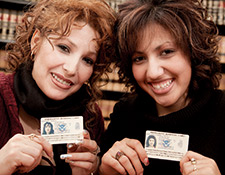Immigration Law Clinic Helps Client, Daughter Achieve Permanent Resident Status
by Ashley Matthews
 Jesus Muniz, left, and daughter Jahaira Carrillo |
For Jesus Muniz and her daughter, a long and difficult road to permanent resident status in the United States finally ended last fall with the help of the Law School’s Immigration Law Clinic.
The achievement was the culmination of years of work by clinic students, who helped Muniz use a law designed to help women escape abusive relationships without jeopardizing their pursuit of permanent immigration status.
“I was so grateful to have someone to help,” Muniz said. “At that time, I had nothing, no money, and I was scared about how everything was going to work. It was a miracle to find people like [clinic director] Doug Ford and the students.”
Muniz was referred to the clinic in 2006 by a shelter in Danville, Va. The Mexican immigrant had complicated circumstances surrounding her quest for legal status, which began when she petitioned for permanent resident status through her sister. However, Muniz met and married an American man, which invalidated the petition she had previously filed. She re-filed for residency through her new husband after she had moved with him from Texas to Virginia.
Soon after the move, Muniz said her husband became abusive. She eventually moved, with her teenage daughter, to a shelter.
“He assaulted me verbally, pinched me and he was not being a good man,” Muniz said. “He said if we left, he was going to have us deported. He thought he had us in his hands because he was our only way for citizenship. He was doing drugs, so we moved out.”
This type of situation is not rare, said Patricia Dangelo, who worked on Muniz’ case as a student in the Immigration Law Clinic. Dangelo continued working on the case after she graduated in 2008.
“We develop a personal relationship with each of these clients,” said Dangelo, who is 60. “These cases are very difficult. Abusers use their status to hold the woman hostage with her immigration status."
The U.S. Violence Against Women Act allows women who are the victims of abuse by their American citizen partners to file for permanent residency independent of their abusers. Though Muniz had previously self-petitioned under VAWA, UVA law students assisted her throughout the process of earning permanent residence status. The process was complicated, as Muniz had filed for residency three separate times.
After sorting out an intricate tangle of paperwork, Ford and the students provided constant legal services for Muniz and her daughter, 18-year-old Jahaira Carrillo. They stepped in when Muniz received a traffic citation that could have placed her pending status in peril, and Dangelo prepared and escorted Muniz to her exit interview.
“If I was rich, I would pay so much for the hard work the students have done,” Muniz said. “But I don’t have money to give them, so they have my heart.”
Now that Muniz and Carrillo have both received permanent residence status, they will likely have the opportunity to become American citizens in the future. Muniz is working as a restaurant manager in Danville, and is also attending community college. Carrillo, who has also been attending community college, hopes her new status will enable her to begin attending a full-time, four-year university later this year. She plans to major in biology.
Dangelo said the experience of assisting the women in their petition for residency was immensely rewarding.
“Immigration is a thankless job. You spend a lot of time telling people there’s nothing you can do,” Dangelo said. “When you see someone finally get something, you think ‘Yes!’ It’s so exciting when they get their status. They know they can stay here and finally be comfortable.”
The Immigration Law Clinic is offered in partnership with the Legal Aid Justice Center. Ford said working with clients through a clinic offers an invaluable opportunity for students to practice real law.
“This is a public service. The law student gets to work with a real person, understand the facts and then figure out how it fits into a legal framework. The student then persuades, makes critical judgments and strategizes,” Ford said. “It can be a challenge, working across language, across culture. The student has to put the client’s story together with the law. It’s core legal skills and advocacy.”



